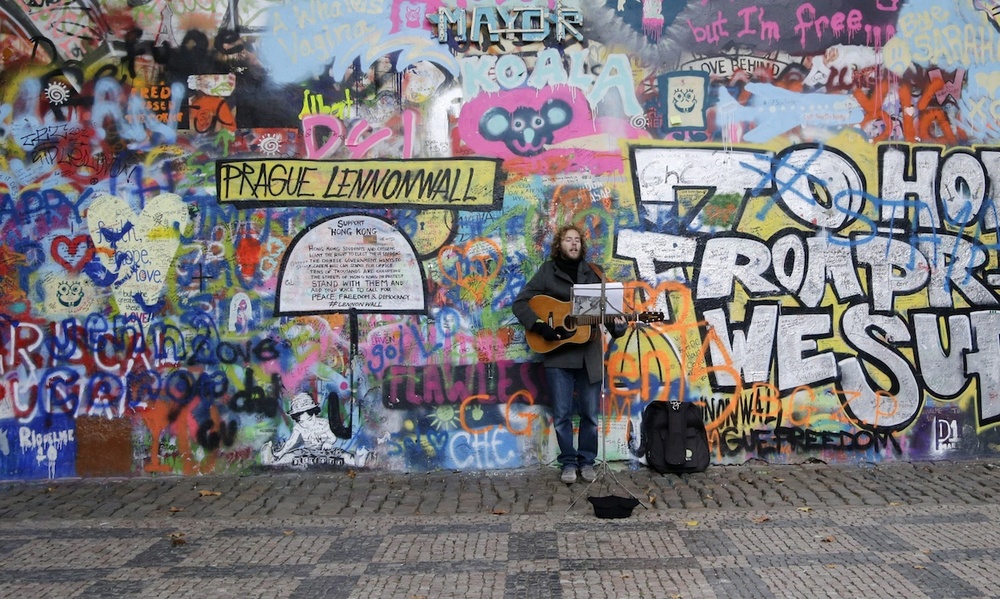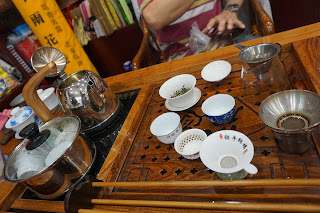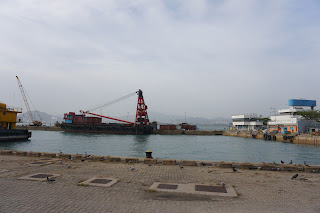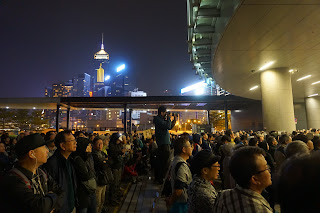   |
 a fisherman, a view to the water and a friend, laurie wen, in hong kong |
 |
| protests, temples and banyan trees were everywhere. |
On my last day in Hong Kong, I met Laurie Wen.
She sent me an email for where to meet.
So, tomorrow morning around 11, can you meet me at the HKU
(Hong Kong University) stop on the MTR? I'll meet you at the C2 Exit, on the
street level.
If you're coming from the Olympic station, take the MTR
toward Hong Kong station, then at Hong Kong station you walk underground to
Central station (an 8-min walk) and take the Island line (blue) toward
Kennedy Town. The HKU stop is the one before Kennedy Town. Allow ~35 min from
your hotel. From the Mong Kok station you take the Tsuen Wan line (red) toward
Central. At Central you transfer to the Island line (blue) toward Kennedy
Town. The HKU stop is the one before Kennedy Town. Allow ~40 min from your
hotel.
I’ve known Laurie since 2002 with ACT UP and 2003 when we
were arrested at an anti-war protest, and were swept
up by the police. Afterwards, we sued the City of New York In the case, our
lawyers with the Center for Constitution Rights alleged:
“1. This civil rights action, brought pursuant to the
United States Constitution
and 42 U.S.C. § 1983, seeks redress for defendants’ bogus
arrest of scores of peaceful protesters. Defendants, members of the New York
City Police Department (“NYPD”), inexcusably abused their power and
authority, thus depriving plaintiffs of the rights, privileges, and
immunities secured by the Constitution and laws of the United States and the
State of New York.
2. On April 7, 2003, defendants wrongfully, maliciously
and without
probable cause, arrested more than 70 people, including
the 52 plaintiffs in this case, whose only
“crime” was exercising their constitutionally protected
right to engage in peaceful protest against the war in Iraq and those
profiting from the war, specifically the Carlyle Group.”
With video evidence that contradicted the city’s accounts
of our actions, we beat the city in court, although one never gets back the
time one spends in jail. Our central argument was that there is something terribly
wrong with a system that arrests people for asking questions or meeting in
the streets.
When we won a settlement for our arrests, Wen called to
ask me what I thought we should do with the money.
She thought we should organize to buy a collective space. I ended up paying bills with the
money. Wen had other ideas.
Over the years since our suit, we stayed in touch,
organizing together, going to ACT UP actions, joining the Occupy movement in
New York in 2011, where Laurie supporting programs for healthcare for all,
working the street medics, as well as Occupy Health and Doctors for the 99%.
In 2014, when the Umbrella Movement sprouted in Hong Kong,
Wen, who grew up in Hong Kong, moved back to join the movement, sleeping out
in the streets with the activists, supporting the two and half month
occupation.
When I saw her, we had a lot to talk about. Walking through Kennedy Town, we started
talking about the Umbrella Movement and Chinese history and what she was
doing in Hong Kong. Every time we started talking, a new topic went on stack,
as she pointed out a new politician or topic.
“There is Judy Chan.
She is the enemy,” she noted, pointing to a campaign poster for a
conservative politician.
“I love the trees here,” I followed, pointing to trees in
the park across the street from her house.
“Those are banyan trees. They get their nutrients from the air. They don’t need soil. They can grow out of any wall…”
“Its like they are reclaiming the city. The world needs more of this.”
“I have a lot of favorite trees here, we can go see a few
of them today.”
We walked down the street and she told me about a protest
we were going to tonight.
“It wouldn’t be a visit in the city for you if there
wasn’t a protest,” she smiled. She
always smiles when she has plans for me, inviting me to some of my favorite
protests over the last fifteen years.
When our friend Mark’s insurance company turned down his claim, she
invited friends to block the entrance of the headquarters and the insurance
company honored his claim. When the UN General Assembly on AIDS convened in
the spring of 2006, she invited me for the civil disobedience outside. I ended up in jail for 24 hours and she didn’t even show up. Her demos
for healthcare during Occupy were legendary.
She told me about the day’s demo. “Its
part of the Umbrella Movement in Central.
Benny Tai drummed up to education civil society and universal
suffrage. The movement is influenced
by Martin Luther King and Dietrich Bonhoeffer, using civil disobedience as a chip to negotiate with the Hong Kong government. And now they are going after him.”
“Is he in jail?”
“Not yet.”
Wen is the author of We
Speak for You: Hong Kong’s Umbrella Movement and the Fight for Global
Democracy. Publisher to be
determined. In the proposal, she
situates the story of the movement:
|
“On September 28, 2014, when tens of thousands of Hong
Kong pro-democracy protesters unfurled umbrellas to protect themselves from
police tear gas, the Umbrella Movement was born. The mass movement for
universal suffrage was led by high school students too young to vote, but drew
participants from across the social and demographic spectrum. It bloomed into a
79-day, nonviolent occupation that paralyzed the heart of one of the world’s
premier financial hubs. A global audience watched the teenage children of an
ostensibly apolitical society face off against the world’s rising superpower,
17 years after the former British colony of Hong Kong returned to Chinese rule
as a “semiautonomous” region, and exactly 25 years after the massacre of
student demonstrators in Beijing’s Tiananmen Square.”
The demo would not start until 7 PM so we had all day
to explore.
She points out a sign for apartments. “Like all cities in the world, Hong Kong is
going through amazing gentrification, pricing everyone out.”
A woman walked by pulling a pile of boxes. “They make money returning the boxes. A few years ago the police arrested one of
these women and the whole community defended her. Now we can buy units at certain restaurants
paying for a meal for an old person.”
Standing outside a tea house, Wen changed the subject
again.
“When I first came to this neighborhood, I walked in
looking for tea,” she explained, pointing to the Yik Yee Teahouse. “The folks
inside are so nice, they told me stories and offered me different teas for an
hour and a half.” So we walked
inside. And Wen introduced me to the
amiable owners. What kind of tea would
you like to try, they asked. Green tea.
I replied. Which kind? We have several.
The owner started heating water and preparing several jasmine teas for
me. Looking at the tea he is arranging, I started to see why the British fell
in love with Chinese tea. Needless to say, he does not drink British tea. We spend the next hour drinking the sweetest
jasmine tea I have ever had. Make sure
to only heat it for eight seconds he reminds me as I leave.”
We spent the afternoon walking and talking about history
and tragedy, loving democracy and
rejecting the colonial legacy.
"All you have to say is three years and eight months and everyone in Hong Kong understands," she explained, reflecting on the legacy of the Japanese occupation. There have been many.
There’s a poetry in the streets, as Wen greets dogs who she’s met
through the year. She tells me about a
tree in Yuem Long, a neighborhood in the Western new territories, that has
enveloped a whole house, growing around it.
Resistance and engagement is everywhere, as this ancient city contends
with a modern dynasty.
In We Speak for
You, Wen wrote:
“Benny Tai, a mild-mannered Hong Kong law professor,
became a prominent thorn in Beijing’s side when he proposed, in 2013, a civil
disobedience campaign to pressure the Chinese government on its unfulfilled
promise of universal suffrage for Hong Kong. Called “Occupy Central with Love
and Peace,” Tai’s plan was to conduct a brief sit-in and block traffic in
Central, Hong Kong’s financial district. In 2014, as dialogue continued on the
proposed sit-in, Hong Kong’s government released a plan to allow “universal
suffrage” in the race for Chief Executive (Hong Kong’s governor)—as long as all
candidates were preapproved by Beijing. In response, students organized a
weeklong class boycott, then tried to take over government headquarters,
rejecting Tai’s appeals for calm. Police beatings and arrests ensued. Tens of
thousands of Hong Kongers, converging to support the students, were met with
tear gas. Protesters opened umbrellas as improvised tear-gas shields, and the
movement found its name.”
At lunch she tells me about the demonstration we are
going to in support of Professor Tai, whose tenure is under threat. The
government is pressuring Hong Kong University to fire him for exercising his
free speech.
Its hard to hear these stories and not think about the
Democracy Movement in China.
I watched the movement in the Spring of 1989 in awe, with more and more people filling the streets.
The world was changing right there.
Wen points out that as the Poles went to the poles,
Deng sent in the tanks.
It was the one of the Democracy movements of 1989 that
was crushed. Yet, somehow it anticipated the Velvet Revolution later that fall
when the totalitarian system controlling Eastern Europe collapsed.
But this did not help the generation of activists who
lead the June 1989 actions in China. Leaders, such
as Fang Lizhi were forced out of their jobs, into exile, if they were lucky
enough to get out.
A quarter century later, the Umbrella Movement began
with similar cries for freedom of speech and suffrage, Wen continued.
When authorities threw teargas on the students, their
actions unleashed generational dynamics as elders asked, how could you do this
to our kids? How could you treat them
this way? This triggered the 79 days of
occupation.
The shadow of 1989 keeps making its way back into our
conversation
In our movement, people are obsessed with Eastern
Europe, notes Wen, referring to the Singing Revolution that brought down communist
rule in Estonia.
“We Shall Overcome was the first song I sang in jail
on March 27, 2003” after the die-in in front of Rockefeller Plaza, in protest
of the coming Iraq War. Chilled ran down my back as I watched Wen and company scream 'No Blood for Oil!!!' during their action. Police eventually dragged everyone away into jail.
Walking
after lunch, we talk about Dr
Wan Yanhai, a Chinese doctor who spoke up about HIV, particularly after he
found out HIV contaminated blood was being given the general population,
creating orphanized villages. When he was jailed, ACT UP worked to bring
international attention to his jailing. After ACT
UP worked with international human rights groups, he was released from jail and
eventually came to the United States. I consider fighting to Dr Wan’s
freedom one of my greatest achievements in ACT UP.
Walking, we
strolled past temples, up, down stairways, across streets, over to the Sai Won
Pier, a container terminal and cargo
dock in the Western District Public Cargo Area, the
space reminds
me of New York from three decades ago.
People are hanging out, making art, painting, cruising, taking in the
water, snapping photos and sharing ideas. Laurie shows me her favorite spots,
where people walk dogs. And olders ride bikes. The construction
materials look like art projects. The
bamboo looks like an installation. Two
guys are doing karate. The space feels
open and wild, with ideas flowing everywhere.
And because
of this, the space is contested.
Eventually
we come up to a fence.
“This is why
people are upset,” she laments.
“Fences are
part of capitalism,” I reply, using the old Naomi Klein line. All around the world, contested spaces involve similar clashes between users and owners of spaces vying for access and control.
That’s the interplay
of public space. But without access to the street, questions about democracy basically go out the door.
Our conversation
turns back to the Velvet Revolution and the Lennon Wall, of pro-democracy slogans
and Beatles lyrics, that students created in the 1980’s in Prague. The art was an ongoing nuisance for the
communist leadership before the Wall crumbled.
 |
| The Lennon Wall, Mala Strana, Prague. |
Inspired,
the Umbrella Movement created its own wall, noted Wen. It was a space for a mosaic
of political messages calling for democratic election of Hong Kong’s chief executive. Its in the Central Government Complex, Harcourt
Road, Admiralty, where we are going tonight.
Making our
way, we stroll by the old university, looking at the Banyan Trees extending out
of the walls and sidewalks, into the air, this way and that, over the roads. We meet Alec sitting in the Cozy Bean coffee
shop, sitting looking at art deco architecture, talking about his sister's band,
punk and alt country music.
Our day is starting
to take on the complexion of My Dinner with Andre, as we talk and talk and
talk.
But we’re
just getting starting. I’m starting to
get slap happy, thinking about getting to the demo.
My friend
Mike is in town. He’s going to meet us
at the demonstration at Central.
We wind down
hills, through a coffee shop full of Chet Baker posters called Lets Get Lost. The
city looking more and more like San Francisco, with views down to the water.
“When I was in Tower Records, I met a drummer who used
to play with Chet Baker,” gushed Wen.
“When we
were in Amsterdam, we stayed in the hotel where he fell to his death, stumbling
off the roof,” I recalled.
Wen points
to a restaurant, where people cook for the elders, notes Wen. There’s always more to show.
Arriving at
Central, an elder woman is scolding the cops standing around for pepper
spraying the kids. I’m not sure this has
just happened or its something that has happened in the past.
Wen looks
out. We occupied all of this, pointing
to the streets, a highway running around us. This was where we put together our
Lennon Wall.
The
demonstration is full of people talking, giving speeches. Laurie introduces me to a few college
students, who helped organize the Umbrella Movement when they were high
school.
Isak tells
me he is here because of the attacks on Benny Tai. The government is going after him. I just hope people will be more willing to
speak the truth, Isak concludes. He worries they will not be able to if the Communist Party has their way.
Would you
like me to tell you what is going on, asks Pong, another man walking with us.
Yes, of
course.
We’re here
to support Professor
Tai. He said something that the communist
government doesn’t like, basically suggesting its worth thinking about what life
will be like when the communists government is gone. What kind of a government should we have? They do not want the people to control their
own destiny. We’re here to say that its like the Nazi’s. They don’t have that power
now but they would do it. The new
president is like Mao. He’s like Putin.
Walking in
Reverend Chu Yue Ming, one of the Occupy Three, who along with Benny Tai and
Chan Kin-Man organized the Occupy Central with Love and Peace campaign, is
speaking. Ming famously smuggled
activists out of China in June of 1989.
In and out
of court, today fame is their protection, notes Wen, greeting elders and
friends, introducing me to everyone.
A student
asks me to sign his petition in support of Catalonia in Spain. We discuss this situation. And I tell him I disagree with his point. But that’s
ok. That’s what democracy is all about.
The two
agendas for the movement are Hong Kong independence and free speech, notes
another man, standing beside us, talking with my friend Mike and I. He spent two nights sleeping in the streets
and working during the Umbrella movement.
Mike and I concur. We were both
working during Occupy Wall Street. I
only slept in the park one night. Freedom
is something everyone can get behind, our friend smiles.
He tells me about Hong Kong Basic Law Section
number 23. Its an anti-subversion law, he explains. The law states Hong Kong, “shall enact laws on its own to prohibit any act of treason,
secession, sedition, subversion against the Central People's
Government, or theft of state
secrets, to prohibit foreign political organizations or bodies from conducting
political activities in the Region, and to prohibit political organizations or
bodies of the Region from establishing ties with foreign political organizations
or bodies…" Benny Tai gave a speech suggesting
that the Communists were not going to be here forever. So we might as well think about what life
might be like without them. What are we going
to do? No regime lives forever. The
government did not like this speech. And
now they are using basic law section 23 to go after him. The line around the law shifts over and over
again.
Edward Yiu, one
of the movement’s
two disqualified officials planned to speak at the rally, suggested this felt like the first days of he
cultural revolution.
The crowd
roars. Benny Tai speaks and the crowd
gets even louder.
Its an
uphill battle to fight for democracy here.
All around the world, we are losing freedoms, in Russia, in the US, and
in Hong Kong. I hope people wake up,
notes Pong.
We lose
freedom gradually. This is what is happening
But not in
all parts.
The streets
of Hong Kong feel as vibrant as ever.
As usual, we
all debate where to go after the rally. People stand around talking.
Laurie takes
us to So
Boring, a pay as you wish café in Kowloon.
With tables outside on the street, it’s a lively place. Mike and I bring a couple of beers we bought
at a bodega and sit down to plates of curry and noodles, one delicious plate
after another. The food is wonderful. We end up paying close to nothing for the
meal. It’s the best of many great meals I’ve
had in Hong Kong. We eat quickly as our last demonstration of the night is
about to start. And we can’t be late as
they tend to be very very punctual, notes Wen, who missed one once because she
was running on New York activist time.
With
adrenaline pumping through our veins, we walk to our final rally of the day,
passing bright streets, full of people and neon lights everywhere, rushing to
join the Gau Wu protests. Why Gau Wu, I ask. It’s a word for shopping. After the Occupation was shut down, activists
gathered in the street of Mong Kok every night, non stop. Finally the chief magistrate
said people should go back to shopping to boost the economy. Activists responded, going out into the
streets, where they have been every night since then, calling for more
democracy. A new form of protest was born.
Standing outside
by a group carrying yellow umbrellas, signs declare this, “a democracy
street.” A woman gives me a flyer describing what they are doing:
“Today, the “Gau
Wu” group symbolizes the persistence of fighting for democracy and human dignity. People father in Sai Yeung Choi Street South
Every night, carrying their slogan flag
of “Genuine Universal Suffrage”, chanting political messages, cruising the area
in procession with their Yellow Umbrellas open. Political speeches are made every night to
keep our passion alive, believing that our dreams will come true one day.
Volunteering to stand up for civil rights, we are not associated with any organizations
or political parties. In the absence of
leader, any Hong Kong residents could join and leave any time. Together we fight for our only demand – Genuine
Universal Suffrage.”
Several of
the people, including the woman who screamed at the cops at the rally earlier, are
here. They welcome everyone, giving us umbrellas to carry through the street.
We talk for
a while and then march, engaging the crowd through the night.
The
demonstration reminds me of the moral witnessing of the New York Shut it Down: the grand central crew #blacklivesmatter actions. Friends meet, talk, disrupt and act up together,
building a community, between the elders, students, and countless others leading
the Umbrella Movement.
When we
leave, the activists thank all their friends and universal supporters.
Take an
umbrella with you to New York, notes one activist.
After our twelve
hours of walking together, Laurie, Alec and I say goodnight. Mike and I wander back to Mong Kok over to
grab a pint at Big
Wave Bay, on Pok Man Street, where our adventure began.
I’ll be
leaving Hong Kong in a few hours. I can’t
really sleep. Its been too exciting. So I
toss and turn and start writing this blog about a day I that seemed to go on
forever, a movement for democracy which first awoke my consciousness three
decades ago. In the years since, it became
subject to books and my fascination. But
for a moment, I was able to support this movement, stretching through time, connecting Tiananmen Square to Occupy
Wall Street to Occupy
Central with Love and Peace.
My taxi drove
me to Kowloon and I said goodbye, with an umbrella in my hands.
 |
| A last glimpse of Mong Kok after a day for the ages, people collecting boxes. |
 |
| bs alec and laurie by mike duncan |














































































































































































































No comments:
Post a Comment